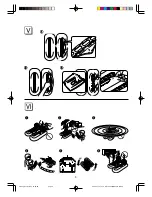
ENG
6
Precautions
Safety first
• Adult supervision strongly recommended, and use extra caution, when playing near
water or ice. Stay off of lakes or any other body of water.
• Drive your vehicle in a safe area away from people, pets, cars, etc. Do not drive on
streets or after dark.
• Do not touch or try to pick up the vehicle when it is in motion. Wait until it stops
completely.
• Keep hair, fingers, face and loose clothing away from top and rear propellers while
the vehicle is switched on or while the transmitter is operating.
• Never block rotation of top lift fan or stick any object through top, bottom or rear
grilles.
• Do not drive hovercraft into walls or other hard objects.
• Be a responsible Stealth Hovercraft
TM
operator!
Batteries and Charger
Included: 9.6-Volt Rechargeable Battery Pack and Battery Charger for NiCd or NiMH
Battery Packs and One 9-Volt (6LR61).
Not included: Optional High Capacity Ni
Cd
or Ni
MH
Battery Packs with 750mAh or
higher.
Use those optional batteries for a longer run time.
Battery Cautions
CAUTION: TO AVOID BATTERY LEAKAGE. (OF 9-VOLT (6LR61), 9.6V NiCd OR
NiMH RECHARGEABLE BATTERIES)
1. Make sure the batteries are inserted correctly and follow the toy and battery
manufacturer's instructions.
2. Make sure battery polarity (direction) is correct.
3. Use only battery type(s) recommended.
4. Remove rechargeable batteries from the product before charging. Recharge bat-
teries only under adult supervision and follow the battery and charger
manufacturer's instructions.
Other Battery Cautions
1. Use caution removing battery from vehicle after use. Battery may be hot.
2. Never pull the battery pack out of the vehicle by the wire or plug. Never unplug the
battery by pulling on the battery.
3. Remove batteries from the product for storage.
4. Do not recharge non-rechargeable batteries.
5. Do not short-circuit battery terminals.
6. Dispose of batteries safely and properly, according to your local requirements.
NOTE: NICKEL CADMIUM BATTERIES MUST BE RECYCLED OR DISPOSED
PROPERLY.
ADDITIONAL IMPORTANT BATTERY SAFETY INFORMATION
• Regularly examine charger and battery pack for damage, including plugs, casings
and all other parts. If damaged, do not use.
• Not intended for children under 3 years old.
• Make sure the batteries are inserted with correct polarity and follow the toy and
battery manufacturer's instructions.
• Remove weak or exhausted batteries from the product.
• Battery replacement should be done in presence of adult.
• Only batteries of the same type or equivalent type as recommended in the "Battery
Installation" (or replacement) instructions are to be used.
• Non-rechargeable batteries are not to be used.
• If removable rechargeable batteries are to be used, they are only to be charged
under adult supervision.
• Rechargeable batteries are to be removed from the product before they are charged.
• If you use a battery charger, it should be examined regularly for damage to the
cord, plug, enclosure and other parts. Do not use a damaged battery charger until
it has been properly repaired.
• Dispose of batteries safely and properly.
THIS PRODUCT USES A NICKEL CADMIUM BATTERY. MUST BE RECYCLED
OR DISPOSED PROPERLY.
Contact your local area office of solid waste management or other appro-
priate local agency for information.
Battery Charging and Care
(Batteries and Charger included)
Vehicle will not run without a 9.6V rechargeable NiCd or NiMH battery pack and
matching charger, commonly available for R/C vehicles at many toy and hobby deal-
ers.
Always follow the instructions that come with your battery pack and recharger. Adult
supervision of battery charging is recommended.
Running and Charging Times
1. NiCd and NiMH battery packs are not like alkaline batteries. They lose all their
power suddenly, not gradually, and vehicle will stop very soon after slowing down
becomes noticeable, with little warning. This is normal, but keep it in mind, espe-
cially when operating on water, since you need to get the vehicle back before the
battery power runs out.
2. Typical running time will be between 7 to 8 minutes for a typical freshly charged
NiCd battery pack in good condition (9 to 13 min. for NiMH), but do not rely on this
until you observe how long your battery runs in your vehicle under the conditions
you operate in.
Running time may vary over life of battery, with the first few charge cycles yielding
shorter run times than later charges.
BATTERY CHARGING INSTRUCTIONS
NOTE: "CONDITION" BATTERY PACK FOR BEST RESULTS BY CHARGING AC-
CORDING TO THESE INSTRUCTIONS ON EVERY CHARGE. ON THE FIRST
CHARGE, EXPECT A SHORTER RUN TIME. RUN TIMES WILL INCREASE OVER
THE NEXT 6 CHARGES, REACHING SPECIFIED RUN TIMES.
Drain Down-Cool Down-Charge Up
1. After the first charge, for best performance always run the battery pack all the way
down before recharging. Run until vehicle wheels/fans/motors slow to a stop.
Note: If you are operating a boat, hovercraft or other water vehicle in water,
retrieve the vehicle while battery power is still strong and perform this Drain
Down procedure on land. (Don't operate other kinds of vehicles in or near
water.)
2. Allow the battery pack to cool before recharging.
Battery Heat
1. Battery gets hot after use! This is normal, but be careful. Wait until battery is cool
(20 minutes or more if needed) before charging. Charging batteries when they
are hot will severely reduce the number of times they can be recharged.
2. After charging, battery pack will be warm. This is normal.
RECHARGING INSTRUCTIONS
1. Plug wall pack charger into a standard wall outlet.
2. Connect the battery pack plug to the charger plug as shown in Section II.
3. Red light on charger will light to show charger is operating. Normal charging time
is approximately 4 hours.
4. Unplug charger from wall after 4 hours of charging.
5. After charging, battery pack will feel warm. This is normal.
Rechargeable Battery Tips
1. Don't overcharge the battery pack. Unplug the charger from the wall at the end of
the recommended charging time. (Approximately 4 hours)
2. NiMH battery packs are not like alkaline batteries. They lose all their power sud-
denly, not gradually, and vehicle will stop very soon after slowing down becomes
noticeable, with little warning. This is normal, but keep it in mind, especially when
operating on water, since you need to get the vehicle back before the battery
power runs out.
3. Store your battery pack discharged.
4. Your battery pack will hold a charge for a shorter time in hot weather. Otherwise,
you can charge a battery a day or so in advance of your use or for gift giving.
5. It's better to charge for the full 4 hours, even though the vehicle may operate with
a partial battery charge.
6. When the use out of this battery pack becomes shorter and shorter, it is most likely
time to replace the battery pack.
Stealth̲Hovercraft̲2-19.pm65
2005.01.17, 10:15
Page 6
Adobe PageMaker 6.5J/PPC



























